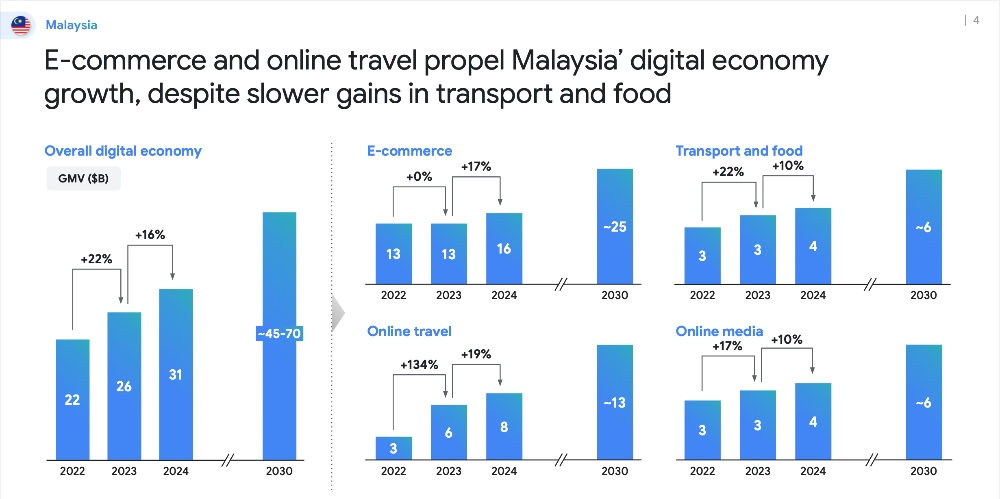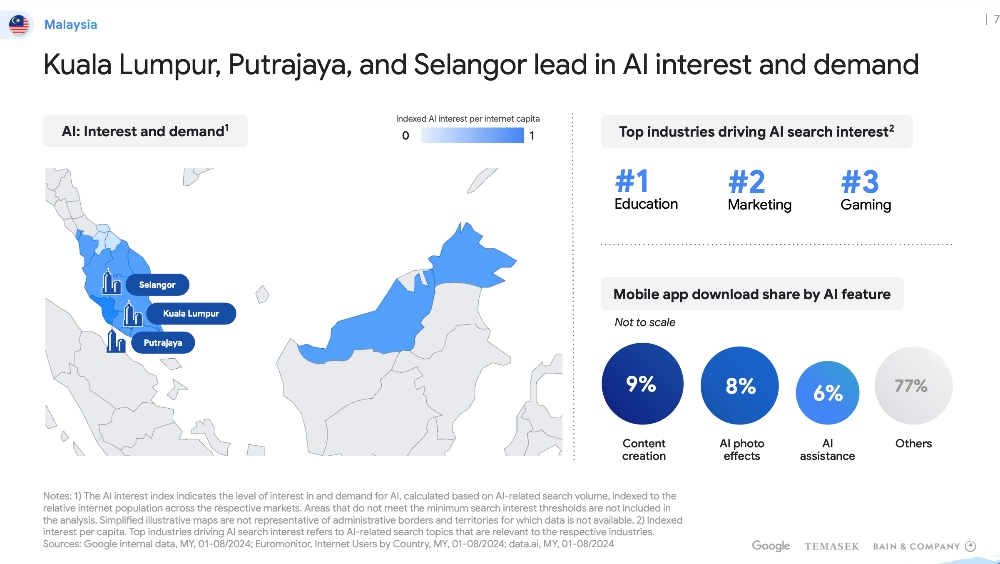e-ConomySEA 2024 report: Malaysia’s digital economy to hit US$31 bil in 2024
By Digital News Asia November 26, 2024
- Online travel led sector growth with a 19% increase, reaching US$8 bil GMV
- E-commerce, the top digital contributor grew 17% to US$16 bil GMV in 2024

Malaysia's digital economy is set to reach US$31 billion (RM138.48 billion) in Gross Merchandise Value (GMV) in 2024, marking a 16% increase from 2023, according to the latest e-Conomy SEA 2024 report by Google, Temasek, and Bain & Company.
Positive growth trends across the digital sectors
Malaysia’s digital economy continues its progression towards profitability while sustaining double-digit GMV growth. The report highlights deeper digital participation, effective monetisation strategies, and recovery in pandemic-impacted sectors as key drivers of this growth.
- Ecommerce: E-commerce remains the largest contributor to Malaysia's digital economy, growing by 17% to US$16 billion (RM71 billion) GMV in 2024. This growth is attributed to reinvestment by major platforms and the rising trend of video commerce.
- Online travel: Posting the fastest GMV growth among sectors, online travel expanded by 19% year-on-year to US$8 billion GMV. Malaysia’s robust recovery in international tourism is expected to surpass pre-pandemic levels in 2024. Spending on overseas travel has increased 330% since 2020, with the Asia-Pacific region accounting for 38% of outbound expenditures. Visitors from Southeast Asia (SEA) represent nearly half (49%) of Malaysia’s inbound travel spend, driven by enhanced air connectivity, strategic airline partnerships, and favourable exchange rates.
[RM1 = US$0.224]

- Food delivery and transport: These sectors grew by 10% from US$3 billion GMV in 2023 to US$4 billion in 2024, bolstered by recovering commuter demand and international travel. Food delivery platforms are enhancing profitability through tiered delivery options and subscription plans, while ride-hailing sees intensified competition with new entrants and expanded services.
- Online media in Malaysia has shown consistent growth with its GMV expected to grow 10% from $3 billion in 2023 to $4 billion in 2024, driven by the increasing popularity of digital content, games and streaming services.
- Digital financial services continues on an upward trajectory as various Malaysia’s digital banks offer compelling features and ease of access, contributing to the rapid growth of the DFS landscape. Digital payment is expected to reach $172 billion in 2024, a 5% increase from 2023, while digital wealth is expected to significantly expand and reach an assets under management (AUM) of approximately $80 billion by 2030.
.jpg)
Malaysia to seize the AI opportunity
Artificial Intelligence (AI) is reshaping Malaysia's digital economy. The government’s commitment to responsible AI development through the Malaysia AI Roadmap 2021-2025 and the upcoming launch of the National AI Office (NAIO) underpins this transformation. The report identifies Malaysia as one of the top ten countries globally for AI search interest, particularly in education, marketing, and gaming, with Kuala Lumpur, Putrajaya, and Selangor leading the way.
As more companies deploy AI to innovate, improve efficiencies and customer experiences as well as bring new ideas to life, the demand for AI infrastructure will continue to grow. To meet this demand, Malaysia has recorded a large AI infrastructure investment among SEA countries at $15 billion in H1’24. The report estimates Malaysia's current data center capacity at 120MW and expects that to expand 5X over the coming years.
Malaysia has seized the AI opportunity through strategic initiatives like KL20, which will bolster the startup ecosystem through incentives for high-tech industries, tax exemptions on foreign investments and a billion dollars in government funding for startups in Malaysia and the region.
“As Malaysia assumes the Asean Chairmanship next year, we aim to be a regional champion for digital policies that are forward-looking and transformative, to promote a regulatory environment that encourages technological advancement and to nurture cross-border collaboration. The e-Conomy report serves as a powerful validation of our efforts and is not merely a report; it is a testament to the immense potential that lies ahead for Malaysia's digital future,” said Gobind Singh Deo, minister of Digital as represented by Fabian Bigar, the secretary general of the Ministry of Digital at the event.
“It is a call to action for all of us – the government, the private sector, and the people of Malaysia to collaborate and realise our nation's full digital potential. Let us seize this opportunity and together, build a digitally empowered Malaysia that is prosperous, inclusive, and sustainable,” he added.
 Meanwhile, Farhan Qureshi (pic), country director for Google Malaysia said: “We have been seeing a consistent strong growth of Malaysia’s digital economy and this year is another strong testament of the potential of Malaysia’s digital economy. With the region's focus on AI, it’s encouraging to see the country's leaders are putting AI and semiconductors in the country’s priority list.”
Meanwhile, Farhan Qureshi (pic), country director for Google Malaysia said: “We have been seeing a consistent strong growth of Malaysia’s digital economy and this year is another strong testament of the potential of Malaysia’s digital economy. With the region's focus on AI, it’s encouraging to see the country's leaders are putting AI and semiconductors in the country’s priority list.”
"At Google, we are committed to further support the growth of Malaysia's digital economy by accelerating the local workforce with AI-ready skills and tools. From equipping youths with future-ready skills in AI through Google Career Certificate scholarships to deploying Google Workspace for public officers, we are dedicated to ensuring Malaysia remains at the forefront of the digital age," he added.
Amanda Chin, partner, Bain & Company, noted: “Southeast Asia’s digital economy thrives on double-digit GMV and revenue growth and a surge in profitability across sectors led by key players. Likewise in Malaysia, we see a healthy digital economy driven by e-commerce, online travel and digital financial services.”
“As the country’s DFS sector embraces digital disruption, new technologies such as AI are poised to accelerate growth. To fully harness the transformative potential of Generative AI, businesses must advance beyond experimentation and invest in foundational elements—aligning AI initiatives with core business objectives to address real-world problems and create tangible value, strengthen AI talent, and build scalable, adaptable infrastructure for sustained growth,” she added.
Geia Lopez, head of data, insights, and international growth at Google Southeast Asia, added: "Investments in AI and the growing interest in its applications signal a bright future for Malaysia's digital economy. However, prioritising digital security is essential to sustaining this momentum and fostering trust in the evolving digital landscape."
Click here to download the report.
Related Stories :


